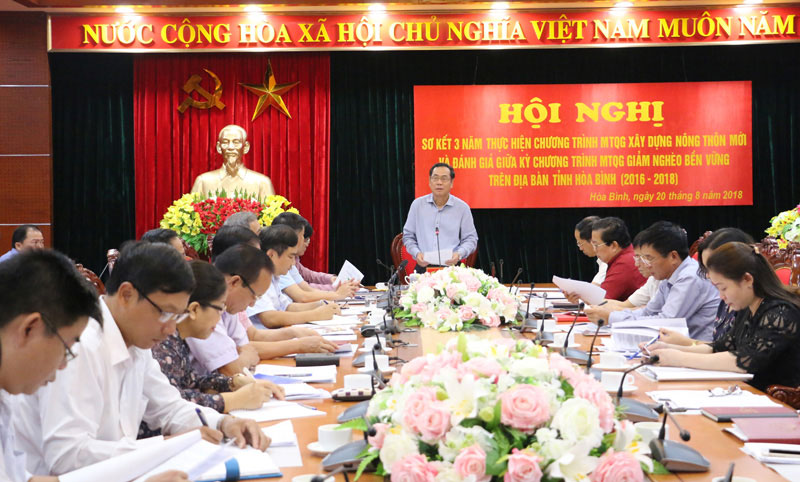
(HBO) – The People’s Committee of the northern mountainous province of Hoa Binh recently held a teleconference with its districts and city to review the implementation of the national target programmes on building new-style rural areas after three years (2016-2018) and on sustainable poverty reduction in the 2016-2020 period.
Deputy Secretary of the provincial Party Committee and Chairman of
the People’s Committee Nguyen Van Quang presided over the conference.

Vice Secretary of the provincial
Party Committee and Chairman of the People’s Committee Nguyen Van Quang
delivers a speech to conclude the event.
During the implementation of the national target programme on
new-style rural area building in 2016-2018, the province fulfilled more than 65
percent of the criteria and tasks which were assigned by the Prime Minister
until 2020, despite a range of challenges. All communes have met at least seven
criteria of the programme and Hoa Binh city is expected to receive the status
of new-style rural area this year.
This was attributable to the efforts of party committees, administrations
and Fatherland Front Committees at all levels, along with all organisations
from provincial to grass-root levels and local people.
Total financial sources to carry out the target programme on
new-style rural area building in three years reached about 6,654 billion VND (293
million USD). As a result, infrastructure has been upgraded, giving a facelift
to rural areas.
Many production models prove to be effective, generating high
income for local people. Per capita income in Hoa Binh’s rural areas in 2018 was
estimated at 24.8 million VND (1,063 USD). To date, 51 communes of the province
have been recognised as new-style rural areas, equivalent to 67 percent of the
plan. Each commune has fulfilled an average of 12.62 of the total criteria, or
85 percent of the plan.
The national target programme on sustainable poverty reduction
also saw positive outcomes, as infrastructure in disadvantaged regions has been
built. Policies on poverty alleviation have been promptly carried out, which improve
people’s welfare and access to social services.
Therefore, in late 2017, the province’s poor household rate dropped
to 18 percent, (38,293 families). The figure sees an annual decrease of 3.19
percent, meeting the target.
In late 2018, the rate is expected to fall 14.9 percent, down 3.1
percent year-on-year and 9.48 percent against the same period of 2016,
representing a annual decline of 3.16 percent./.
Hoa Binh province is undergoing a dynamic transformation amid Vietnam’s national digital transition. Building on Poliburo’s Resolution No. 57-NQ/TW on breakthroughs in science, technology, innovation, and national digital transformation, the province has rolled out a wide range of practical action plans. A standout initiative is the "Digital Literacy for All” movement, an effort to ensure that no one is left behind in the digital era.
Hoa Binh province is undergoing a dynamic transformation in the wake of the national digital transformation movement. Building on Resolution No. 57-NQ/TW of the Politburo on breakthroughs in science, technology, innovation, and national digital transformation, the province has implemented a wide range of practical action plans. A standout initiative is the "Digital Literacy for All” movement ambitious effort to ensure that no one is left behind in the digital age.
With a spirit of unity and proactive problem-solving, the Party Committee, the government and the people of Dong Lai Commune (Tan Lac District) have made great strides in implementing the resolutions of the 24th Party Congress of the commune for the 2020 - 2025 term. Focusing on leadership and practical actions, the commune has brought the Party’s resolutions into daily life, creating strong impacts and pushing the local development forward.
Amid the nationwide push for digital transformation, young people in Hoa Binh Province are stepping up as dynamic pioneers, applying technology to enhance Youth Union operations and expand the reach of youth-led initiatives. Through creativity and adaptability, Youth Union organizations at all levels have introduced a series of practical solutions, contributing to modern governance and community development.
In recent years, An Nghia commune, located in Lac Son district, has stepped up administrative reform, focusing on improving the quality and efficiency of its single-window service unit for receiving and processing administrative procedures. These improvements have helped create favourable conditions for local residents and organisations to handle administrative procedures, contributing to the commune’s broader socio-economic development.
The Prime Minister-approved master plan to develop the multi-use value of forests ecosystems through 2030, with a vision to 2050, aims to improve the management and sustainable use of forest resources, create jobs, increase incomes, and improve the living standards of ethnic minorities, people in mountainous and remote areas, forest workers and those living near forests.



